Infants have new protections against respiratory syncytial virus, but for now, availability is limited. Here, experts brings you up to speed on what you need to know about the new pediatric RSV immunizations.
Respiratory syncytial virus (RSV) is a major cause of illness in young children and is the leading reason why infants are hospitalized. Until recently, this viral infection was difficult to prevent or treat.
Now, two new effective prevention methods are available. The first is nirsevimab, which is approved and recommended for infants 0-8 months old and select older infants with certain high risk conditions. The second is a new immunization available for pregnant patients, called Abrysvo, which leads to a 57% decrease in the chance of infant hospitalization due to RSV.
Availability of nirsevimab is limited, and newborn children staying in NICUs currently have priority for receiving the immunization. Abrysvo is more widely available at obstetrician offices and local Walgreens pharmacies.
But, how do the immunizations work? And are they safe and effective?
Here, Mary Casert and Jennifer Nayak, both infectious disease experts at the University of Rochester Medical Center, provide insight on how they will benefit newborns:
What is this new RSV immunization nirsevimab and who is it for?
Nirsevimab has been in development for several years and was created specifically for newborns aged 0-8 months and select older infants at risk for severe disease from RSV. Unlike traditional vaccines that stimulate immune memory and “train” your body to recognize RSV, nirsevimab provides antibodies directly to fight the virus.
While a traditional vaccine provides a cook book-like recipe that the body uses to build immunity over several weeks to fight RSV, nirsevimab is ready to fight RSV as soon as its given.
Fortunately, because it is active immediately, nirsevimab given to newborns provides protection against RSV at the ages that children are most at risk for severe disease (0-8 months). In fact, nirsevimab has been shown to decrease the risk of RSV-related hospitalization and avoid the disruption to a family’s routine that a hospitalization causes.
In addition to babies 0-8 months during their first RSV season, children from 8-24 months old who are at high risk for RSV infection may be eligible to receive nirsevimab during their second RSV season. For more information, contact a health care provider.
How was the nirsevimab vaccine tested for safety and efficacy?
A total of 1,490 infants were studied as part of the phase 3 nirsevimab trial: 994 were assigned to the nirsevimab group and 496 to the placebo group. This study demonstrated that nirsevimab reduced severe disease and hospitalization from RSV by 80%, a huge win for the health of babies.
There were fewer adverse events in the nirsevimab group during the trial versus the placebo group, indicating that the vaccine is safe.
How does nirsevimab differ from other infant RSV immunizations, such as Synagis?
Both nirsevimab and Synagis protect infants by providing antibodies directly to the infant to fight off the virus. As a result, their bodies do not have to learn how to fight the disease, but instead get the end result of protection.
The main difference for parents to note between the two vaccines is that an infant needs to meet specific criteria to qualify for a prescription for the Synagis vaccine. These criteria, such as being born very prematurely (less than 29 weeks) or having heart or lung disease or a problem with the immune system, limit the number of infants able to receive Synagis. In addition, Synagis has to be administered once a month throughout the RSV season to qualifying infants who have not had the viral infection.
Nirsevimab, on the other hand, has been FDA approved for all infants in the first 8 months of life and for high risk children in their second year. Nirsevimab can be administered in a single dose that will provide protection throughout the RSV season, safeguarding infants during some of the most critical and vulnerable ages.
When can families get access to nirsevimab?
Access in the Monroe County/Finger Lakes region in New York state (and across the country) is very limited at the moment, with premature newborns in hospitals getting first priority. The goal for later this viral season and throughout all of next year’s season and beyond is to expand availability so that all newborns have the option of receiving nirsevimab before they are discharged from the hospital.
What is Abryvso and who is it for?
Abryvso is recommended for people who are 32 through 36 weeks pregnant during September through January. When a pregnant person gets the RSV vaccine, protective antibodies pass to the baby over the course of about two weeks. The vaccine can decrease the chance that the baby will be hospitalized from RSV by 57%.
The most common side effects from the vaccine are similar to other vaccines, including pain at the injection site, headache, muscle pain, and nausea.
Why is it important to protect against RSV?
Studies show that RSV is one of the most common causes for hospitalization and death of infants and children from birth to 5 years old, with nearly 80% of hospitalized infants showing no previous underlying conditions or contributing factors.
Infants and children who are born prematurely (before 30 weeks) and those who are immunocompromised are at higher risk for developing severe infection and have higher rates of intensive care unit admissions when infected with this virus.
Currently, the CDC’s Advisory Committee on Immunization Practices and the American Academy of Pediatrics are recommending that this vaccine be given during the first 8 months of life to protect infants when they are most vulnerable to serious illness from this virus.
Can babies get RSV, COVID-19, and influenza immunizations at once? Has this been tested?
Infants younger than six months old are not eligible for influenza or COVID-19 vaccines. However, children older than age six months can receive all three at once, as each vaccine protects against a different infection and nirsevimab is not expected to interfere with the immune response to other vaccines.
Source: University of Rochester



